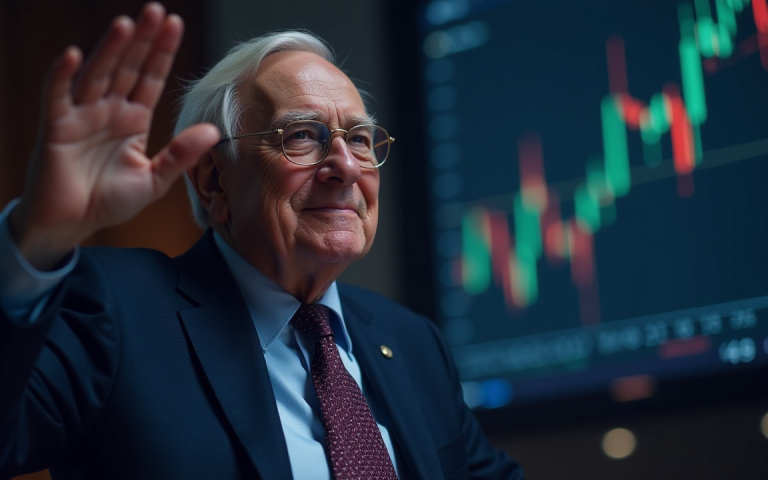With Warren Buffet announcing he will relinquish the role of chief executive officer at Berkshire Hathaway by the end of 2025, analysts appear divided over whether the development will have a long-term bearing on the Berkshire Hathaway stock.
While some market observers believe Buffett’s exit could erode Berkshire’s premium valuation over time, others remain confident in the company’s long-term prospects.
Berkshire stock had climbed around 20% this year through Friday, outperforming the broader S&P 500 index, which was down 3% in the same period.
The stock dropped sharply on Monday following the succession news and disappointing quarterly earnings.
Class A shares fell 4.4% to $773,493, while Class B shares declined 4.5% to $516.05.
In after hours trading on Monday, class A stock was up by 2.30%, while class B stock recovered by 0.3%.
The succession
Buffett announced his departure from executive leadership in a surprise declaration at the conclusion of the company’s annual meeting.
The 94-year-old investing legend recommended Greg Abel, the vice chairman overseeing Berkshire’s non-insurance operations, as his successor.
The Berkshire board of directors approved the transition plan on Sunday.
While Buffett will no longer serve as CEO after next year, Berkshire confirmed early Monday that he will remain chairman.
Buffett also said he expects to have an informal role at the company, acting as an advisor to Abel “when needed” starting in 2026.
Abel, who has been at the helm of Berkshire’s sprawling non-insurance businesses since 2018, is widely regarded as a steady hand and close confidant of Buffett.
His elevation had long been speculated, but the formal announcement ends years of uncertainty over the succession at one of America’s most closely watched conglomerates.
Q1 earnings miss, Berkshire’s high cash hoard raises questions
The decline in Berkshire Hathaway’s stock can be attributed, in large part, to Warren Buffett’s deep association with the company’s long-term success since investors have long viewed Buffett as integral to Berkshire’s identity and performance.
However, the company’s first-quarter earnings, coming in below expectations, also added pressure.
Berkshire reported operating profit of $6,073 per Class A share, trailing the consensus forecast of $7,077 and marking a decline of about 14% from the same quarter last year.
Additionally, Berkshire was a net seller of stocks during the quarter, offloading $4.7 billion while purchasing $3.2 billion, resulting in net sales of roughly $1.5 billion.
Its conservative capital deployment disappointed those who had anticipated Buffett would capitalize on recent market volatility.
Berkshire’s cash hoard continued to climb, reaching nearly $335 billion after accounting for the timing of Treasury bill purchases.
The massive war chest reflects Buffett’s continued struggle to find attractive investment opportunities in a market he deems overvalued.
KBW cuts EPS forecasts for on weak projections
This cautious stance, coupled with weaker earnings, led some analysts to temper their near-term expectations for Berkshire.
Meyer Shields of KBW lowered his 2025 and 2026 earnings forecasts by approximately 1.5% each, citing weaker projections across both insurance and non-insurance segments.
Shields wrote in a client note that profits fell short “in Primary and Reinsurance, Manufacturing, and Railroads, Utilities, and Energy, and other income, partly offset by outperformance in GEICO and Service and Retailing.”
He now expects 2025 earnings of $30,865 per Class A share and 2026 earnings of $32,605.
Shields maintained a “Market Perform” rating on the stock but increased his price target slightly from $730,000 to $735,000 per Class A share.
He wrote that the Berkshire valuation “very fully reflects its earnings prospects and balance sheet strength amidst ongoing macro uncertainty and the emerging management succession (which will probably impact investors’ view of Berkshire more than it will actual operations) in Mr. Buffett’s just-announced retirement plans.”
Doug Kass, president of Seabreeze Partners, urged caution, tweeting on Monday that “the company will likely — in the fullness of time — lose its premium valuation” without Buffett at the helm.
“Stated simply, don’t bottom fish in Berkshire Hathaway,” he wrote, adivising against buying the stock.
UBS expects “minimal disruption” from leadership change, stays bullish
In contrast, UBS analyst Brian Meredith maintained a bullish stance, reiterating a “Buy” rating and setting a price target of approximately $909,000 for Class A shares and $606 for Class B shares.
“While it is hard to imagine anyone with the investing talents of Buffett, the structural advantages of “permanent capital” and having the vast array of BRK’s business to gather information to aid investment decisions remains,” Meredith wrote.
Meredith expects minimal disruption from the leadership change, citing Berkshire’s stable mix of businesses and strong liquidity of around $347 billion in cash and short-term investments.
Meredith acknowledged the Q1 miss, driven by lower insurance investment income and softer manufacturing and retail results, but emphasized the strength of Berkshire’s insurance underwriting and operational resilience.
“Buffett leaves a company that is less reliant on his investing capabilities, with an array of leading businesses with strong cash flows,” Meredith wrote.
“Operationally, we expect little change at Berkshire.”
As Buffett prepares to pass the torch after nearly 60 years at the helm, investors will closely watch how the company navigates this historic transition—and whether Abel can command the same confidence in markets that Buffett has long inspired.
The post Warren Buffett stepping down: analysts assess what it means for Berkshire stock and investors appeared first on Invezz

